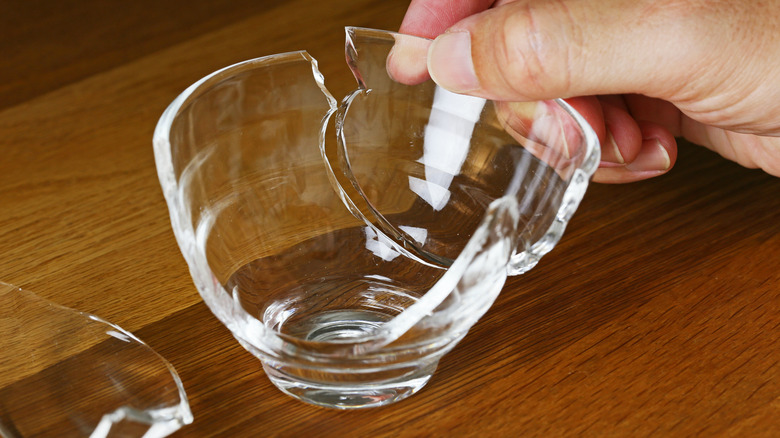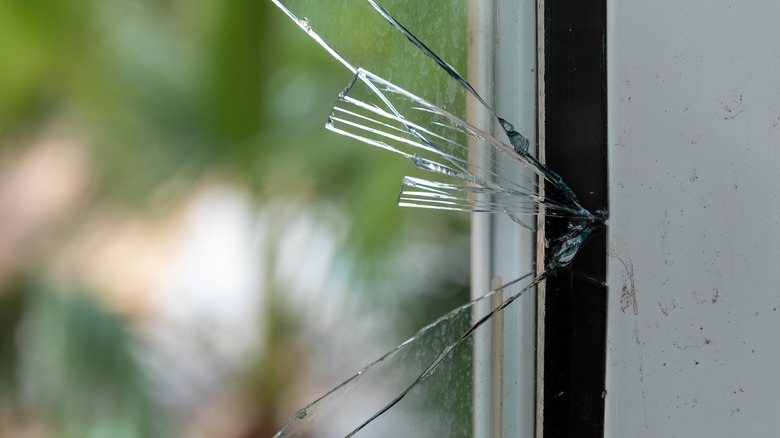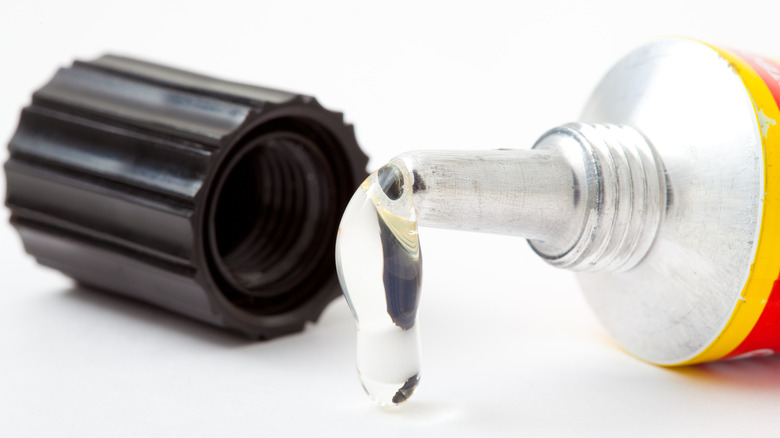Can You Use Super Glue On Glass? Here's What You Need To Know
Take a quick scan of your arms and hands. How many scars do you have from dealing with broken glass? You've probably been gouged on other parts of your body, too. In general, it's safest to whisk glass shards into the trash, even if you're dealing with an essential or beloved object. But sometimes replacement isn't a possibility, and we've got to piece together our broken item. Whether it's a window or a wine glass, we might want to reach for super glue for repairs. A tube of super glue – aka cyanoacrylate adhesive – is regularly on hand in most households. It's clear, waterproof, and durable. But is it any good on glass? Rest assured, DIY repairers, some professionals claim that it's the top glue for cracks and shatters.
However, the super glue formula you should use depends on what glass item you're repairing. There are some important things you need to know about fixing cracked glass that you want to get more mileage out of. Cleaning it, piecing it together, filling any gaps, and patching it with the correct type of glue is painstaking work. Make sure your effort is worth the time by sourcing a super glue formula that's tailored for what you need — and we'll tell you how.
When can you use super glue on glass?
Super glue is a go-to for fixing almost anything around the house on the cheap. Reach for a tube of the stuff if you have a cracked window, picture frame glass, or broken wine glass stem. Contributors to message boards rave about Loctite and Gorilla Glue, claiming that applying a conservative amount can make the mend nearly invisible. Super glue, especially one formulated specifically for glass like Loctite Glass Glue, is ideal for mending decorative objects that aren't handled often.
Getting chips in your windshield can cost around $35 per nick. That adds up quickly if you live in an area with lots of gravel on the roads. For a small fraction of the price of a professional repair, you can dab on a bit of super glue to the chip, and it can prevent the small nick from becoming a fracture that requires replacing the whole windshield. If you opt to use super glue on your car windshield, though, you should be warned that professionals caution against using super glue on glass in extreme temperatures or places where your windshield will get a lot of UV exposure. Also, take care to clean your windshield thoroughly before use and be precise when applying it — super glue dries quickly, and it's not a forgiving material to work with.
Why super glue isn't always the best fix for glass
Despite super glue's strength and accessibility, its bonds are best for items that don't get lots of heavy use. The glued edges won't hold up well under high impact or bearing weight. While cyanoacrylate works like a charm to keep broken pieces from pulling apart, an unexpected bump that compresses or twists your repaired object could have it back in pieces. If you're using super glue to repair a wine glass stem, for instance, check whether or not it's dishwasher-safe or even suitable for hand-washing.
There are hidden downsides to using super glue around the house, and unfortunately, there are some that can do you harm. Exercise caution when using it, and don't inhale it or get it on your skin. Additionally, you may have seen super glues marketed for glass and ceramic repair that are advertised as food-safe. Yet there is not a lot of information available to back up companies' claims that you can use their glues on items that touch food. The FDA's list of adhesives that are approved for use with food products doesn't include cyanoacrylate, so until you see evidence that it is food-safe, you may want to hold off on fixing things you eat and drink from with super glue.


